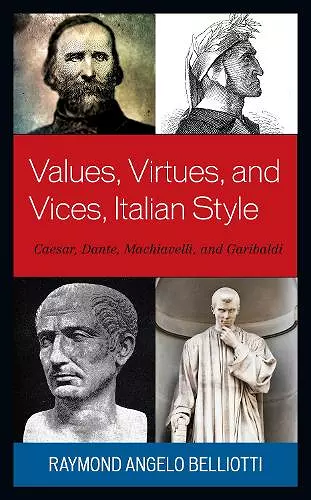Values, Virtues, and Vices, Italian Style
Caesar, Dante, Machiavelli, and Garibaldi
Raymond Angelo Belliotti author
Format:Hardback
Publisher:Associated University Presses
Published:26th Aug '20
Currently unavailable, and unfortunately no date known when it will be back
This hardback is available in another edition too:
- Paperback£35.99(9781683932772)

Values, Virtues, and Vices, Italian Style illustrates the story of the evolution of Italian values, virtues, and vices is a narrative of longing, exhilaration, and devastation, a journey of the spirit that all human beings necessarily undertake but navigate with varying degrees of success. The lives of Caesar, Dante, Machiavelli, and Garibaldi demonstrate how we can lead staunchly meaningful lives even within an inherently meaningless universe. The ambition of this work is nothing more, nothing less, than entangling, through a careful examination of the values, virtues, and vices of four famous historical figures, a host of overlapping but distinct concepts, such as pride, honor, justification, excuse, repentance, and forgiveness that frame human existence. Belliotti’s objective is that by conducting such an interdisciplinary inquiry we might better position ourselves to craft our characters within the limitations enjoined by our cosmic circumstances. As always, however, we must deliberate, choose, and act under conditions of inescapable uncertainty; assume responsibility for the people we are becoming; and, hopefully, depart the planet with honor and merited pride. Along the way, we might even magnify our link in the generational chain that defines our identity.
Belliotti provides us with a clear, fascinating look into the lives and philosophies of Caesar, Dante, Machiavelli, and Garibaldi. This work is a must-read for those interested in Roman history, ideas, and culture, and for those interested in the history of philosophy. From Caesar’s will to power to Dante’s conception of human happiness to the problem of morally dirty hands in Machiavelli to Garibaldi’s code of honor, Belliotti guides the reader through an excursion into some of the most important problems of value for these figures which are overlooked by most contemporary philosophers. -- J. Angelo Corlett, San Diego State University
Belliotti’s twenty-third book is an outstanding example of the project he has honed to perfection: topically on morals and manners, historically informed, widely ranging over literature; capable of being read with profit by the philosopher and the common reader alike. Perhaps it was inevitable that he would take stock, review his record, and attempt to answer that most elusive of questions: “Who are you?” Belliotti’s ‘lives’ of Caesar, Dante, Machiavelli, and Garibaldi recall Plutarch in their structure, length, illuminating detail, and sense of surprise. With equal subtlety and empathy, he examines the sources of human motivation, failure, and achievement. -- John Paul Russo, University of Miami
This work is an enticing read that masterfully uncovers the common thread of values, virtues, and vices of four leading figures of Italian heritage. Belliotti’s writing is informative and engaging and invites the reader’s return. His philosophical analysis of ‘will to power’ and incisive analysis of ‘honor codes’ invites the philosopher to linger in deeper consideration of the values and virtues all individuals earn in varied yet similar human struggles. This work underscores the value philosophy brings to the study of character and its impact on shaping historical events. -- G John M. Abbarno, D'Youville College
ISBN: 9781683932758
Dimensions: 233mm x 160mm x 26mm
Weight: 585g
272 pages